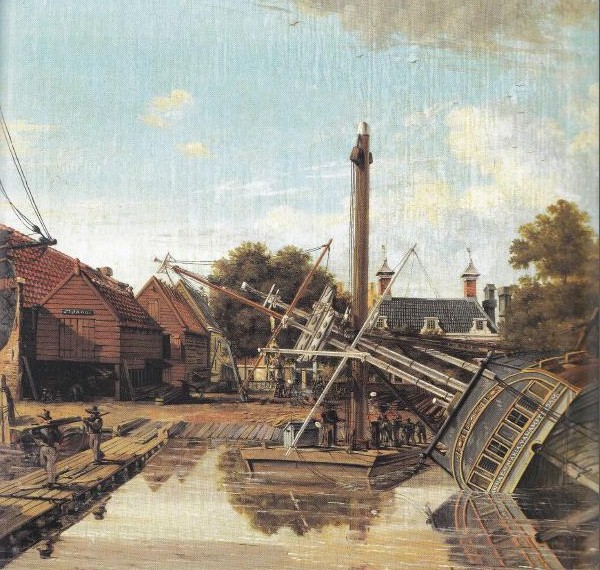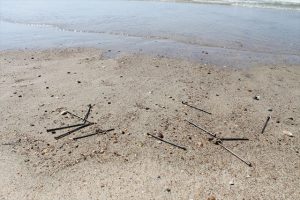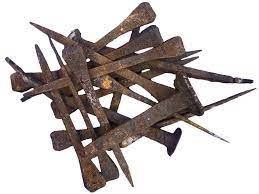Page Description
The idiom can convey messages of being overly critical or pedantic, focusing on small and insignificant details,
similar to the English idiom ‘nitpicking.’

Spijkers op laag water zoeken .
(= opmerkingen over kleine en onbeduidende zaken)
LOOKING FOR NAILS AT LOW TIDE.
(= comments on small and insignificant matters)
Literal translation: “Looking for nails at low tide.”
Meaning: Being pedantic about small details.
English Equivalent: “Nitpicking.”
The Dutch saying “Looking for nails at low tide” is appropriate for a person who is “looking for trouble”, a bit of a whiner. He or she makes remarks about small and insignificant matters and makes it seem as if they are very important.
What is the origin of this expression?
The best known refers to shipbuilding. The well-known linguist F.A. Stoett reports in his 1925 book of proverbs that shipyard staff sometimes went out to look for nails that had fallen into the water during carpentry.
In those days nails were valuable, but finding them was apparently not always easy, so that the expression ‘looking for nails’ took on the general meaning of ‘looking for trifles which are almost impossible to find’.

Pedantic
adjective disapproving
Giving too much attention to formal rules or small details
They were being unnecessarily pedantic by insisting that Berry himself, and not his wife, should have made the announcement.
Donnish
adjective UK
Intelligent, often in a way that is too serious
He was a thin, donnish-looking man in a tweed jacket and sandals.
Being pedantic about small details. English Equivalent: “Nitpicking.”
Belerend zijn over kleine details. Engels equivalent: “Nitpicking.”
Nitpicking
Informal disapproving
Giving too much attention to details that are not important, especially as a way of criticizing
If you spent less time nitpicking, you’d get more work done.
However, there is another explanation for the origin of the expression, also originating from shipbuilding. Some repairs were better carried out with screws than with nails. This is because the latter can loosen or give way more easily under stress. Taalgenootschap OnzeTaal:
“If, after repairing his ship, a skipper wanted to check whether the repair had been done with screws and not with nails, he would let the ship run dry in order to see. Finding nails in low water would then go back to this check: looking for the minute difference between a nail head and a propeller head.”

Evasive Answers and the Misuse of Justice
“Looking for Nails at Low Tide” can be seen as a symbolic search for truth, where answers are given that aren’t real answers, but instead beating around the bush. It’s a dialogue of the deaf, a conversation where no genuine attempt is made to find common ground, but where the truth is deliberately avoided or concealed. As Voltaire once said: “Those who can make you believe absurdities will make you commit atrocities.” This highlights how such evasions are not credible and are often used to misuse justice, obstructing accountability and undermining real resolution.
This version emphasizes the lack of credibility in the answers and how they’re used to evade justice.
Ontwijkende Antwoorden en het Misbruik van Justitie
“Naar spijkers zoeken bij laag water” kan worden gezien als een symbolische zoektocht naar waarheid, waarbij antwoorden worden gegeven die geen echte antwoorden zijn, maar eerder om de hete brij heen draaien. Het is een dovemansgesprek, een gesprek waarin geen oprechte poging wordt gedaan om gemeenschappelijk begrip te vinden, maar waarin de waarheid bewust wordt vermeden of verborgen. Zoals Voltaire ooit zei: “Diegenen die je absurditeiten laten geloven, zullen je ook laten deelnemen aan verschrikkingen.” Dit benadrukt hoe dergelijke ontwijkingen niet geloofwaardig zijn en vaak worden gebruikt om justitie te misbruiken, verantwoordelijkheid te ontlopen en echte oplossingen te ondermijnen.
Ex-Post Office company secretary questioned over Horizon scandal
For years, she’s remained silent over what she knew about the wrongful prosecution of subpostmasters.
But tomorrow, the former head of the Post Office, Paula Vennells, will break that silence when she appears at the Horizon IT inquiry.
Today, it was the turn of the company secretary, Alwen Lyons, who was at every board meeting – and party to many secrets after 34 years in an organisation that caused untold suffering for hundreds of subpostmasters.
Educational: This video is essential viewing
Educational: This video is essential viewing
Post Office Inquiry: Alan Bates delivers brutal assessment of bosses
Today was the moment for the real Alan Bates to stand up, as he was sworn in at the Horizon inquiry, delivering a brutal assessment of the Post Office bosses who hounded him and his colleagues, then tried to cover it up.
Post Office Board knew about Horizon system flaws and exclusive document show insurers were alerted
18 jan 2024
As the Post Office Inquiry continues to hear testimony, more and more details are coming to light about who knew what when.
Back in 2019, the Post Office spent at least a-hundred-million pounds still defending the Horizon system when more than five hundred subpostmasters won their landmark settlement.
Tonight, we’ve seen documents that appear to show that the Post Office Board was aware of the Horizon system’s failures back in 2013 – indeed it was so worried about a potential miscarriage of justice that it alerted its insurers.
Educational: This video is essential viewing
Educational: This video is essential viewing
Post Office Scandal: Horizon engineer defends IT system
25 jun 2024
A former Fujitsu engineer who helped to design the flawed Horizon IT system has told the Post Office inquiry that it had been “working well”.
(Subscribe: https://bit.ly/C4_News_Subscribe)
Gareth Jenkins said he had been confident that any bugs in the system were being fixed quickly. And he insisted he had not understood what it meant to be an ‘expert witness’ and had never been told about the legal obligations that entailed.
‘Anything to say to her?’ Post Office investigator Stephen Bradshaw challenged over Horizon scandal
11 jan 2024
Post Office investigator Stephen Bradshaw challenged over his role in the Horizon scandal that saw many sub-postmasters jailed due to errors in an IT system.
for latest breaking news from the UK, US and around the world, plus podcasts and features.
Former Post Office boss Alan Cook challenged during inquiry over treatment of jailed sub-postmasters
12 apr 2024
A former managing director of the Post Office has said an email suggesting “subbies with their hands in the till” were blaming Horizon is one he will “regret for the rest of my life”.
Alan Cook, who was in the position from 2006-2010, described his words as “unacceptable” and denied it represented his actual views at the time.
More secret tapes prove Post Office boss briefed on system backdoor
2 apr 2024
More shocking revelations from secret recordings obtained by Channel 4 News show that Post Office boss Paula Vennells was briefed about allegations of a “covert operations teams” – and that it could remotely alter sub-postmasters accounts from Fujitsu’s HQ without them knowing.That was in 2013. Seven years later, in letters to a parliamentary committee, Paula Vennells insisted she had been told by Fujitsu this was not possible.
Meanwhile the Post Office had taken innocent sub-postmasters to court, saying they must have stolen money when their accounts failed to add up – a miscarriage of justice that the tapes also reference.
“Looking for nails at low tide” is a phrase that can have various interpretations depending on the context in which it is used. Here are some possible key points that could be associated with this phrase:
Opportunity during challenging times: “Looking for nails at low tide” can imply that during difficult or challenging situations (represented by low tide), one can find opportunities (represented by nails) that may not be apparent at first glance. It may suggest that in adversity, one should look for hidden or overlooked possibilities to overcome obstacles or achieve their goals.
Resourcefulness and creativity: The phrase can also emphasize the importance of being resourceful and creative in problem-solving. During low tide, when the tide is farthest from the shore, one may need to search diligently and creatively to find nails, which could symbolize solutions or resources that may not be readily available or obvious.
Patience and persistence: Searching for nails at low tide can be time-consuming and require patience and persistence. It may suggest the need to persevere and not give up easily when faced with challenges or setbacks, as the desired outcome or solution may take time and effort to uncover.
Value in unlikely places: “Looking for nails at low tide” may also highlight the value of exploring unconventional or unexpected places to find what one needs. It can encourage thinking outside the box and being open to exploring different avenues or perspectives in order to achieve a goal or solve a problem.
Timing and timing: The phrase “low tide” suggests a particular time or condition, which could represent a fleeting or temporary opportunity. It may emphasize the importance of being aware of timing and taking advantage of favorable circumstances when they arise, as they may not last indefinitely.
Overall, “Looking for nails at low tide” can convey messages of opportunity, resourcefulness, persistence, open-mindedness, and timing in the face of challenges or adversity. The interpretation and key points may vary depending on the context in which the phrase is used.
Garbage collector prank
16 mrt. 2011